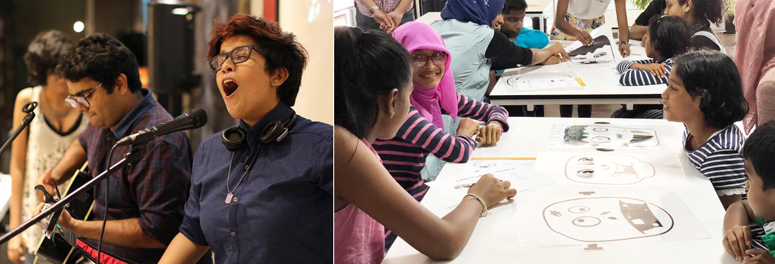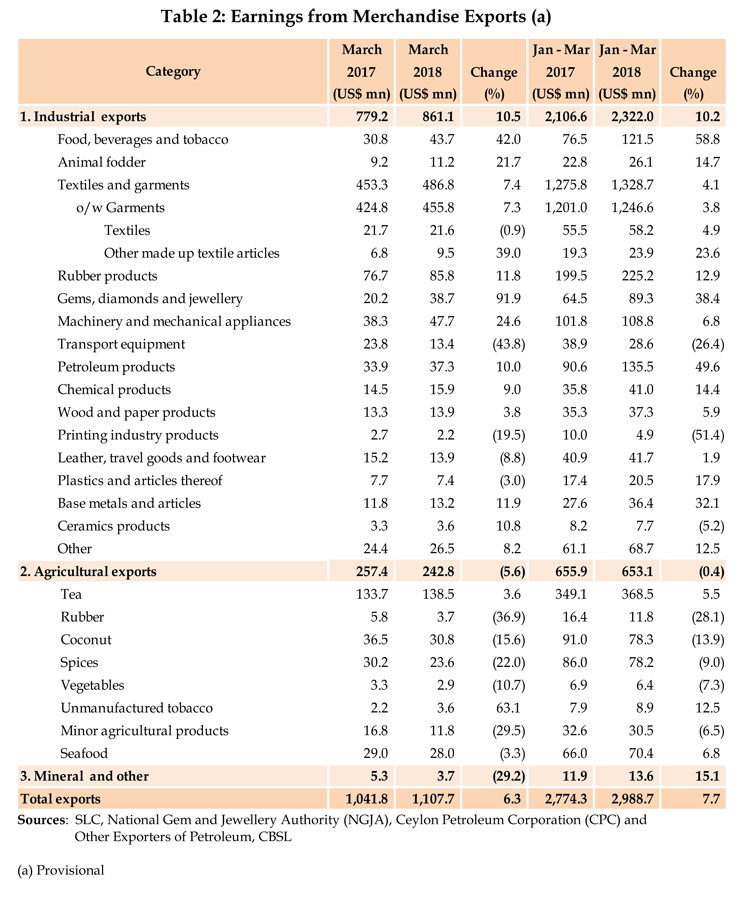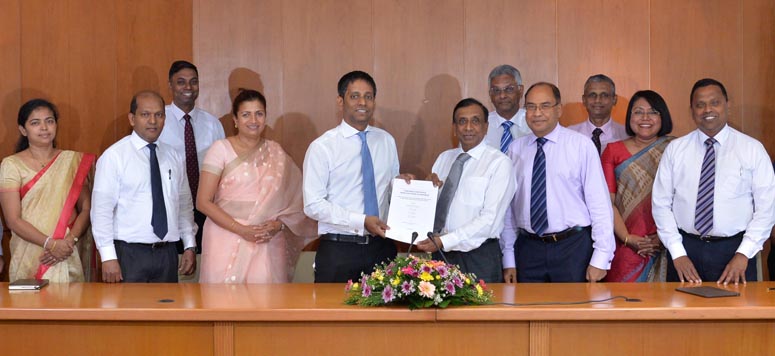Sri Lanka signs deal with Schlumberger subsidiary for $50 million seismic study
Newcomer Third Space Global awarded Great Place to Work 2018 status

(Left) GPTW CEO, Kshanika Ratnayaka presenting Third Space Global with the GPTW award and (right) Earl and Countess Wessex visiting TSG in Jan 2018
Not Just About Books- it all happens at the new British Council Colombo Library

Real estate ‘hotspots’ in Sri Lanka’s South-West quadrant
Watawala Tea Ceylon Limited celebrates exceptional 2017 at Annual Convention


Firaz Markar to head STAX digital practice
Unilever and Mindshare’s Team Unilever Win Top Global Digital Honors
Sri Lankan shares fall to 5-month closing low; John Keells declines
Global Black Tea output to rise 2.2% in a decade lead by China, Kenya and SL
Major output increases in China, Kenya and Sri Lanka will reflect in a 2.2% annual rise in global Black Tea production in a decade, total output volume reaching 4.4 million tonnes, a report had revealed recently.
Accordingly releasing a new report about global tea consumption and production, Food and Agriculture Organization’s Intergovernmental Group (IGG) on Tea, revealed that China would reach the output levels of Kenya, the largest black tea exporter in the world over the next decade. The report further added that Global output of green tea is foreseen to increase at an even faster rate of 7.5% annually to reach 3.6 million tonnes in 2027, largely driven by China, where the production of green tea is expected to more than double from 1.5 million tonnes in 2015-2017 to 3.3 million tonnes in 2027.
The report, however, had warned producers of climate change threat to tea production as tea production is highly sensitive to changes in growing conditions.
“Changes in temperature and rainfall patterns, with more floods and droughts, are already affecting yields, tea product quality and prices, lowering incomes and threatening rural livelihoods,” the report said adding that Tea can only be produced in narrowly defined agro-ecological conditions and, hence, in a very limited number of countries, many of which will be heavily impacted by climate change.
“These climate changes are expected to intensify, calling for urgent adaptation measures. In parallel, there is a growing recognition of the need to contribute to climate change mitigation, by reducing carbon emissions from tea production and processing.”
The report, urges tea-producing countries to integrate climate change challenges, both on the adaptation and mitigation front, into their national tea development strategies.
While world tea consumption has increased over the last decade, traditional importing European countries, with the exception of Germany, have seen a decline in consumption levels, the report said adding that overall, the European tea market is largely saturated. Per capita consumption has been declining for more than a decade, facing competition from other beverages, particularly bottled water.
“Over the next decade, Western countries, in general, are expected to see lower consumption growth” report said. According to the report in the UK, for instance, tea consumption is projected to decrease as black tea struggles to maintain consumers’ interest amid increased competition from other beverages, including coffee. The report, which was finalized by IGG, at its biennial meeting in Hangzhou, China, suggests that tea consumption has also benefited from increased awareness about the beverage’s anti-inflammatory, antioxidant and weight loss effects.
“Such health and wellbeing benefits are seen as the key drivers of future consumption growth” the report highlights.
Merchant Bank of Sri Lanka goes live on Fiserv Signature – Report
Merchant Bank of Sri Lanka (MBSL) has gone live on a pair of systems from Fiserv, including the vendor’s core processing platform Signature, a recent international news report on IBS intelligence outlined.
IBS Intelligence is a leading firm in global fintech, core banking systems news and analysis offering comprehensive research, market reports and consulting services.
According to the report MBSL had selected Fiserv following the merger of two subsidiaries of the bank’s group back in 2015, increasing its branch network from 30 to 48 and adding 100,000 accounts to its database.
The report added that the bank chose Fiserv due to the vendor’s ability to provide “a high level of commitment with 24/7 support”, which was “key to a successful implementation”.
“Consumers want easy and reliable access to banking information and services across a variety of devices,” Marc Mathenz, Managing Director, Asia Pacific, Fiserv had said. According to him Proven technology solutions that allow financial institutions to provide the interactivity their customers expect are key to maintaining a competitive edge.
“Choosing the right technology allows financial institutions like MBSL to take advantage of the substantial growth opportunities in the region and the world” Mathenz has said. The report added that Fiserv landed deals with 26 credit unions in Mexico back in April, all of them using the firm’s DigitalAccess solution. It had two other major wins in that month, too, with Farmers & Merchants Savings Bank and Carter Bank & Trust.
Exports touch US $ 1.1 Bn n March 2018, Historical Highest in a Month
Sri Lanka’s merchandise export earnings at US dollars 1,108 million (US $ 1.1 billion) recorded the historically highest monthly value, recent External Sector performance report released by the Central Bank of Sri Lanka (CBSL) said. However, the year-on-year growth of export earnings in March 2018 moderated as the highest monthly export value for 2017 was recorded in March. Earnings from industrial exports had mainly contributed towards the growth in export earnings.
The report added that under industrial exports, earnings from garment exports recorded the highest value
for a month since November 2013 mainly due to the increase in garment exports to the USA, despite a marginal reduction of exports to the EU. Export earnings from gems,diamonds and jewellery increased significantly in March 2018 mainly owing to higher performance registered in gem exports. Increase in export of vegetable, fruit and nut preparations resulted in an increase in export earnings from food, beverages and tobacco. Meanwhile, machinery and mechanical appliances increased during the month led by electronic equipment. However, earnings from transport equipment declined in March 2018 reflecting the base effect as several yachts were exported during March 2017. Meanwhile, all sub categories under agricultural exports, except for tea and unmanufactured tobacco, declined in March 2018. Tea export earnings increased due to the combined effect of high prices and volumes exported.
Meanwhile, lower volumes of cloves and cinnamon exported resulted in a decline in earnings from spices. Earnings from coconut exports also declined during the month due to the drop in exported volumes of desiccated coconut and coconut oil categorized under kernel products. This decline came from the lower production of coconut due to the lag effect of adverse weather conditions. Leading markets for merchandise exports of Sri Lanka, in March 2018, were the USA, the UK, India, Germany and Italy accounting for about 52 per cent of total exports.

CICT salvages storm-ravaged ‘MV Theseus’
Let your dream take flight with Hanseo University

SriLankan Airlines flight times changed on Sunday

Provident Capital, for a Reimagined Sri Lanka

More butter offers from Pelwatte at Arpico Super Centers
Be party-season ready with The Body Shop’s Summer in the City skincare regime

Sri Lanka Red Cross Society Partners with Mobitel for reliable communication solutions
Acer debuts one-of-a-kind Premium Convertible Chromebooks at Global Launch
 processors providing remarkable performance and exceptional battery life1
• Acer Chromebooks feature dual USB 3.1 Type-C Gen 1 ports for convenient charging and data transfers, and Android app support via Google Play Store
Acer launched one of world’s first convertible Chromebooks, the Chromebook Spin 15 and an updated Chromebook 15 at the annual next@Acer event held in New York last week. The Taiwanese brand introduced these two new premium Chromebooks designed for business use that will be a gamechanger in the consumer market. In keeping with Acer’s focus on style and durability, both models feature an all-aluminum design and a full HD+ 13.5-inch display in a 3:2 aspect ratio. The new Acer Chromebooks are powered by 8th Gen Intel® Core
processors providing remarkable performance and exceptional battery life1
• Acer Chromebooks feature dual USB 3.1 Type-C Gen 1 ports for convenient charging and data transfers, and Android app support via Google Play Store
Acer launched one of world’s first convertible Chromebooks, the Chromebook Spin 15 and an updated Chromebook 15 at the annual next@Acer event held in New York last week. The Taiwanese brand introduced these two new premium Chromebooks designed for business use that will be a gamechanger in the consumer market. In keeping with Acer’s focus on style and durability, both models feature an all-aluminum design and a full HD+ 13.5-inch display in a 3:2 aspect ratio. The new Acer Chromebooks are powered by 8th Gen Intel® Core processors providing exceptional performance and battery life for productivity on the go.
The convertible Chromebook Spin 13 has 360-degree hinges for use as a tablet, notebook, display, or in tent-mode. It comes with a Wacom® stylus (for pen input) that can be conveniently stored in the device slot.
Speaking at the launch, Acer CEO Jason Chen stressed upon the need for style and durability for today’s consumer. “Together with my team, we have come up with so many amazing holistic products offerings that will suit every age and need.” As a leader in Chromebooks, Acer has helped accelerate their adoption in business, education, and at home. As Chrome OS has evolved to include more features, they have responded with designs and form factors that offer meaningful benefits to our customers.”
Both the new Acer Chromebook Spin 13 and Chromebook 13 fully support Android apps via Google Play, so customers can have access to Chrome apps and more than two million Android apps for productivity, connectivity, and fun.
Also launched at the next@Acer event were the new Swift 5 Ultrabook, two gaming laptops and four gaming towers, including the unprecedented Intel Xeon-powered Acer Predator X. Acer also introduced two new power-packed desktops — the Predator Orion 5000 and 3000. The new members join the Predator Orion 9000, Acer’s top-of-the-line PC pedestal.
According to Sunil Nair, General Manager – Singapore & Director – Asia Small Economy Markets at Acer, these products will be launched in Sri Lanka mid June. “Sri Lanka will have all the newly launched products available in the local market simultaneously with Western markets.” He added that focus will be on the “Thin and Light” series (Swift 3) Notebooks and the Predator range of gaming products. “Sri Lankans are very well versed with technology and are one of the first to adopt the latest – be it the latest CPU, Graphics Capability, Full HD Screen etc. In addition, the full gamut of convertible (Spin series) and Detachable (Switch series) Notebooks will also be launched.”
This range of new devices and solutions are targeted towards gamers, creators, families, students and professionals.
processors providing exceptional performance and battery life for productivity on the go.
The convertible Chromebook Spin 13 has 360-degree hinges for use as a tablet, notebook, display, or in tent-mode. It comes with a Wacom® stylus (for pen input) that can be conveniently stored in the device slot.
Speaking at the launch, Acer CEO Jason Chen stressed upon the need for style and durability for today’s consumer. “Together with my team, we have come up with so many amazing holistic products offerings that will suit every age and need.” As a leader in Chromebooks, Acer has helped accelerate their adoption in business, education, and at home. As Chrome OS has evolved to include more features, they have responded with designs and form factors that offer meaningful benefits to our customers.”
Both the new Acer Chromebook Spin 13 and Chromebook 13 fully support Android apps via Google Play, so customers can have access to Chrome apps and more than two million Android apps for productivity, connectivity, and fun.
Also launched at the next@Acer event were the new Swift 5 Ultrabook, two gaming laptops and four gaming towers, including the unprecedented Intel Xeon-powered Acer Predator X. Acer also introduced two new power-packed desktops — the Predator Orion 5000 and 3000. The new members join the Predator Orion 9000, Acer’s top-of-the-line PC pedestal.
According to Sunil Nair, General Manager – Singapore & Director – Asia Small Economy Markets at Acer, these products will be launched in Sri Lanka mid June. “Sri Lanka will have all the newly launched products available in the local market simultaneously with Western markets.” He added that focus will be on the “Thin and Light” series (Swift 3) Notebooks and the Predator range of gaming products. “Sri Lankans are very well versed with technology and are one of the first to adopt the latest – be it the latest CPU, Graphics Capability, Full HD Screen etc. In addition, the full gamut of convertible (Spin series) and Detachable (Switch series) Notebooks will also be launched.”
This range of new devices and solutions are targeted towards gamers, creators, families, students and professionals.
HNB concludes Syndicated Term Loan of Rs 9.0Bn for Sri Lanka’s first waste to energy plant
